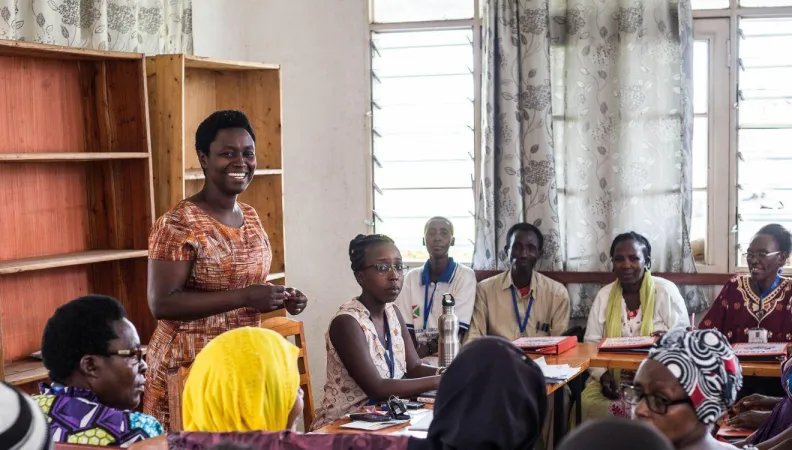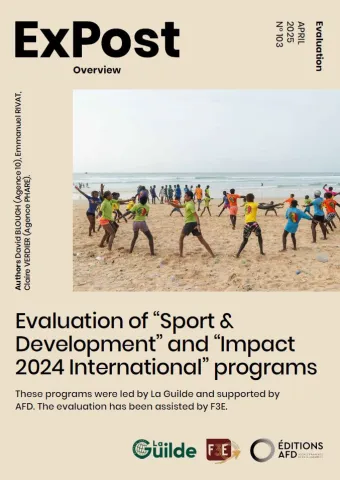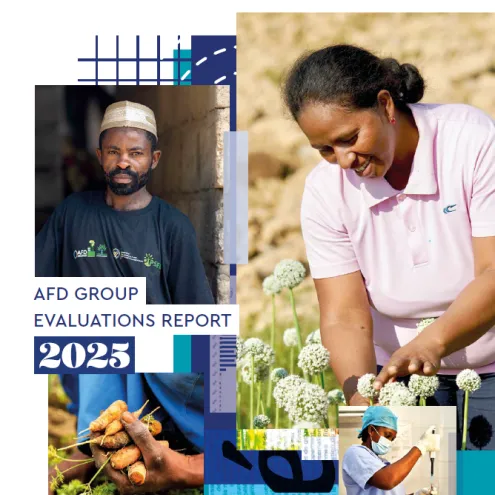Share the page
Evaluations

As a platform serving inclusive and sustainable investment, AFD must ensure the effectiveness of its actions. The generation of knowledge and the lessons learned from evaluations support a continuous learning approach, enabling the Group to adjust its activities to improve their quality and enhance their development impact. Evaluations also represent a key component of AFD Group’s accountability.
Understanding evaluations at AFD
Monitoring and evaluation are playing an increasingly central role in the culture, practices, and tools developed by AFD Group, in support of France’s solidarity-driven and sustainable investment policy. Monitoring and evaluation are essential to:
- Guide the actions and decision-making of the AFD Group and its partners;
- Continuously improve projects, programmes, public policies and, ultimately, development outcomes, by drawing lessons from experience;
- Ensure accountability for the actions undertaken, in a context of increased demand for transparency regarding the purpose and impact of solidarity-driven and sustainable investments.
The Group’s approach for monitoring and evaluation is structured around four main pillars:
- Making evaluations more influential through more strategic planning, improved follow-up of recommendations, and more systematic dissemination of results;
- Designing and conducting evaluations “by our partners' side” and maintaining long-term dialogue on the outcomes of our actions with partners;
- Closely linking project design, monitoring and evaluation in order to fully learn from experience and enhance development results;
- Conducting “tailor-made” evaluations — carried out at the right time, by the appropriate actors, and using the most suitable methods — to maximise their usefulness.
AFD Group monitoring and evaluation policy
These principles are set out in the AFD Group’s new Monitoring and Evaluation Policy, adopted in March 2024.
For the first time, this policy applies to the entire AFD Group. It was developed through a participatory process and informed by the findings of the evaluation of the previous policy, which was established in 2013.
50% of completed projects evaluated: our commitment since 2020
Ensuring the quality of the projects it chooses to invest in is both a duty and an obligation for a public development bank. That is why AFD evaluates — and commissions evaluations of — a large share of its interventions each year, adapting to the expectations of political, administrative, and operational decision-makers. Evaluation is, indeed, a key tool for decision-making and for enhancing the impact of projects.
Learn more: How does AFD measure the impact of the projects it supports?
Types of evaluation at AFD
AFD Group makes use of a variety of types of evaluation, which may combine different methodologies and be conducted at different stages.
Project evaluations (or cluster of projects' evaluation) support dialogue with stakeholders on the results achieved, thereby promoting mutual learning.
Conducted at mid-term, project completion or ex post, they may cover the entire project or focus on specific aspects. Summaries of these evaluations are published.
Published in the ExPost series, these evaluations focus on a theme, sector, geography or financial instrument. They typically cover a broader scope and a longer time frame than project evaluations.
They may also assess sectoral, geographic or cross-cutting strategies, such as gender or climate, with the aim of improving their quality and implementation.
Impact evaluations may be featured in the ExPost or Research Papers series published by AFD. Some may also be published in peer-reviewed academic journals or other AFD research formats.
Several methodologies may be used:
- Counterfactual impact evaluations, closely linked to academic research and contributing to international development debates, aim to measure the improvements strictly attributable to a specific project. These demanding evaluations, in terms of time and resources, usually focus on one aspect of a project rather than its overall results.
- Other approaches combining quantitative and qualitative dimensions may also be used, such as contribution analysis, qualitative comparative analysis (QCA), realist evaluation, outcomes harvesting, ethnographic methods, or most significant change (MSC) approaches.
PAIRES: Impact evaluations mobilising research from the Global South
PAIRES is a partnership between AFD and IRD that funds a series of impact evaluations on development interventions supported by AFD. It mobilises researchers from the Global South on topics such as deforestation, maternal health, or clean cooking. Phase 1 of PAIRES (2020–2024) launched seven impact evaluations across eleven countries. The partnership was extended in October 2024.
These diverse approaches are chosen based on the intended use of evaluation findings. With support from the consulting firm Quadrant Conseil, the Group developed a map of impact evaluation uses. This tool guides discussions with commissioners and partners ahead of evaluations to clarify expected uses and determine the most suitable impact evaluation approach.
Capitalizations and analytical reviews also aim to support internal learning and decision-making, though they do not follow the formal criteria or methodologies of evaluation.
Based on the findings of several evaluations or field experience, they primarily target actions involving collective dimensions, across multiple projects.
They use participatory methods such as workshops and focus groups, enabling operational teams to take a step back and reflect on their practices.
Our publications
The credibility of evaluation work depends on transparency and accountability, especially toward the general public. By publishing our work online, we seek to make it available to everyone.
Over 390 project evaluation summaries available online
The summaries and synthesis reports (also available in French and Spanish) highlight the key lessons and recommendations from the evaluation of a project or a cluster of projects. They are also accessible via the platform opendata.afd.fr.
The ExPost collection, published by AFD, features broad-scope evaluations as well as selected impact evaluations.
Each publication includes a summary, the full report, annexes, and AFD’s official response to the evaluation’s recommendations. Some impact evaluations and knowledge capitalisation studies are also featured in this collection.

AFD also produces filmed evaluations. These more accessible and visual formats are effective tools for communication and training.
Sharing and debating our evaluation work
These formats are designed to share and debate our evaluation work with a broader audience.
Since 2018, AFD has published a biennial evaluation report that sheds light on development issues through the lens of key lessons and main findings from completed evaluations.
AFD Group's Evaluation Report 2025
Do AFD-financed projects deliver tangible results on the ground? Do they have a lasting impact? How can we do better, and do more? In 2023 and 2024, AFD, Proparco and Expertise France carried out over [number missing] evaluations to answer these crucial questions.
This webinar series opens up dialog and critically examines evaluation practices, aiming to improve their quality and enhance their impact on development.

This short format provides an accessible summary of the context, findings, and recommendations of a specific evaluation — designed for all audiences.
Evaluation governance
To ensure the quality, usefulness, and impact of its evaluations, AFD Group has established a multi-level governance system. This governance fosters both internal and external dialogue and is grounded in strong partnerships across the national and international development ecosystem.
Evaluation governance within AFD Group involves maintaining in-depth dialogue at three levels:
- At the level of AFD’s Board of Directors, to make evaluations more influential and strategic:
Exchanges aim to ensure greater consideration of evaluation results and promote their use as decision-support tools for future programming. Evaluation governance should guarantee their relevance for the operational management of the Group’s activities.
- Within the AFD Group itself, to strengthen the link between project design, monitoring and evaluation:
This includes tailored monitoring systems, jointly planned evaluation schedules, and systematic follow-up on recommendations. Internal dialogue follows an integrated logic, connecting all entities within the Group (AFD, Expertise France and Proparco), both at headquarters and in the field. This monitoring and evaluation system ensures that evaluation work becomes a custom-built tool, aligned with the Group’s strategic objectives.
- At the institutional level, to enhance coordination on the evaluation of France’s solidarity-based and sustainable investment (ISD): AFD Group works with key national stakeholders such as the Ministry for Europe and Foreign Affairs, the General Directorate of the Treasury, the Directorate General for Overseas France, and the Development Assistance Evaluation Commission, established in February 2025.
Learning also means strengthening synergies within the broader development ecosystem. AFD regularly engages with its partners on evaluation-related topics:
- In the context of multilateral cooperation for sustainable development finance, AFD’s evaluation teams collaborate within the International Development Finance Club (IDFC) to enhance and harmonise evaluation methodologies, particularly for climate-related projects.
IDFC illustrates AFD Group’s commitment to ongoing exchange with other bilateral development finance institutions, both at the European level (via the Joint European Financiers for International Cooperation) and internationally (OECD, through the EvalNet network). - This international cooperation leads to concrete initiatives, such as MAPME, co-designed with AFD’s key partner KfW. MAPME is an open-access platform offering geospatial tools and Earth observation data to facilitate knowledge-sharing and informed decision-making for sustainable and solidarity-based investment.
- AFD’s scientific impact evaluations also draw on the expertise of world-leading research institutions, including IRD, the London School of Hygiene and Tropical Medicine, and the J-PAL research lab on poverty. In the spirit of evaluating “by our partners' side”, AFD also partners with research centres and national statistics institutes in countries where it operates, through the PAIRES programme. This initiative enables impact evaluations that mobilise Southern-based research to assess AFD-supported development projects.
AFD Group Evaluations Report 2025
Do AFD-financed projects deliver tangible results on the ground? Do they have a lasting impact? How can we do better, and do more? In 2023 and 2024, AFD, Proparco and Expertise France carried out over 260 evaluations to answer these crucial questions.

